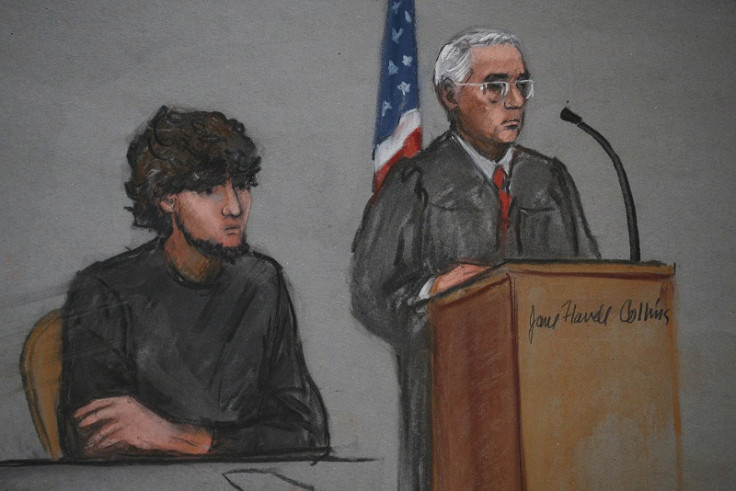Boston Marathon bombing trial: Everything you need to know about the federal case against Dzhokhar Tsarnaev

The Boston Marathon bombing trial of Dzhokhar Tsarnaev is set to continue on 8 April as jurors continue with deliberations.
Tsarnaev is accused of killing three people and injuring over 260 using two pressure-cooker bombs, along with his older brother Tamerlan, during the 2013 Boston Marathon. The two brothers later allegedly killed MIT police officer Sean Collier as they attempted to escape police.
Twenty-six-year-old Tamerlan died four days after the attacks after getting shot by police and then being run over by his brother as he attempted to get away. Dzhokhar's lawyers have admitted the 21-year-old committed the attacks, but he has plead not guilty to all accounts.
Here is everything you need to know about the trial...
Jury deliberations
Deliberations by jurors began on 7 April in the first phase of Tsarnaev's federal death penalty trial. The jury, composed of seven women and five men, will deliberate on Tsarnaev's 30 federal charges. Seventeen of those charges carry the possibility of the death penalty.
Prior to deliberations, jurors heard the closing arguments for both the prosecution and the defence. Lead prosecutor Assistant US Attorney Aloke Chakravarty used his closing argument to remind the jury of the brutality of the bombings and the resulting manhunt using images and video footage. Chakravarty also reiterated the prosecution's belief that Dzhokhar acted alongside his brother in a partnership.
Conversely, Tsarnaev's lawyer Judy Clarke, argued that Tamerlan was actually the mastermind of the attacks and that his younger brother was just following along.
Presiding Judge George O'Toole said he received two questions from the jury before dismissing them on Tuesday. According to WCVB, O'Toole did not reveal what the questions were, but said he would answer them before deliberations began again.
30 federal charges
Tsarnaev's 30 federal charges, including the 17 that carry the possibility of the death penalty, are laid out in a 30 page document. According to WGBH News, counts 1 through 10 and 12 through 18, which involve the planting of the bomb and the killing of Collier, qualify for capital punishment.
The charges faced by Tsarnaev include conspiracy to use a weapon of mass destruction, to bomb a public place and to maliciously destroy property. The jury must decide if Tsarnaev is responsible for placing the two pressure-cooker bombs near the Boston Marathon finish line. Jurors must also decide if he helped his brother plan the attack from start to finish, or whether he merely followed along with his brother's plan.
The defendant also faces charges of possession and use of a firearm during and in relation to a crime of violence resulting in death. According to WGBH, there are nine of these charges, including three relating to the death of the MIT officer.
Jurors will have to come up with an unanimous vote on each charge for Tsarnaev to be found guilty. A complete list of Tsarnaev's charges can be viewed here.
What's next
The jury will have to carefully make a decision on each of the 30 charges before the second phase of the federal trial begins. According to WCVB, the same 12 men and women will hear addition evidence during this second phase to decide whether Tsarnaev is sentenced to life in prison or given the death penalty.
While it is expected that the jury will find Tsarnaev guilty in several of his charges, the resulting punishment is up for debate. According to MSNBC, Tsarnaev's lawyer has successfully advocated for several notorious killers, including Oklahoma City bomber Timothy McVeigh.
If Tsarnaev is sentenced to consecutive life sentences and time for each of the attack's non-death counts, he will never be released from prison, MSNBC reported. The jury also faces the difficult task of coming to an unanimous vote on whether to sentence Tsarnaev to death.
University of California Berkeley professor Frank Zimring told the Boston Herald that the prosecution will have to prove that capital punishment is a "necessity to add to the feeling of security and closure for the people of Boston -- that it's very important for Boston to be 'strong' and this is something that's going to help the community."
Zimring added that this will prove to be difficult for a community that has already done away with capital punishment on a state level. He said, "There are a lot of people who would want him to die, of course, but the question of killing as part of the rebuilding of Boston ... that's going to be a very tough sell."
© Copyright IBTimes 2025. All rights reserved.






















